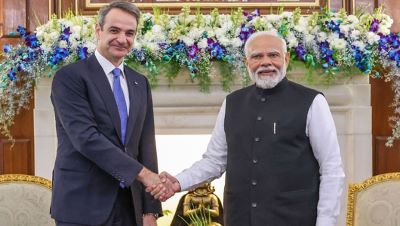Context-
The strategic dynamics of the Indo-Pacific region have garnered global attention, with various nations and alliances emphasizing its significance. Greece, traditionally not deeply involved in the Indo-Pacific, is now showing growing interest in the region. Recent exchanges between Greece and India, along with Greece's strategic and commercial capabilities, signify its potential to contribute significantly to Indo-Pacific strategies. This shift is essential not only for Greece's geopolitical positioning but also for regional security and connectivity.
|
How are India's Relations with Greece? Historical Linkages: India's historical ties with Greece span over 2500 years, dating back to Alexander the Great's campaign in the 4th century BCE, which reached the north-western part of the Indian subcontinent. Diplomatic, trade, and cultural relations between the two nations are noted in Ashoka’s edicts. Evidence of trading between the Mauryan Kings and Greece is found in coinage and writings. Notably, Chanakya documented the presence of a Yavan Ambassador named Megasthenes in Chandragupta's Court. The flourishing Gandhara art, influenced by both Indian and Greek cultures, stands as a testament to their ancient connections. Commercial Relations: Bilateral trade between India and Greece reached USD 2 billion in 2022-23. India primarily exports aluminum, organic chemicals, fish and crustaceans, and iron and steel to Greece, while Greece exports minerals fuels, mineral oils and products, sulphur, and aluminum foil to India. India's participation as the 'Honoured Country' in the 84th Thessaloniki International Fair (TIF), 2019, showcased the depth of commercial engagement between the two nations. Political Relations: Diplomatic relations between India and Greece were established in May 1950, with Greece opening its embassy in Delhi in the same year, followed by India opening its embassy in Athens in 1978. Both countries have consistently supported each other on issues of core national interest, including Kashmir and Cyprus. Greece also advocates for United Nations Security Council (UNSC) expansion, with India as a permanent member. Defence Relations: India and Greece's Defence Cooperation began to intensify in 1998, focusing on military training, joint exercises, and defence industry collaboration. India's participation in EXERCISE INIOCHOS-23 signifies the strengthening of defence ties between the two nations. Cultural Exchanges: Dimitrios Galanos, a Greek Indologist, made significant contributions by spending 47 years in India translating Hindu texts into Greek and compiling a Sanskrit-English-Greek dictionary. The establishment of the "Dimitrios Galanos" Chair for Hellenic Studies at Jawaharlal Nehru University in New Delhi in September 2000 further solidifies cultural exchanges. The Indian Council for Cultural Relations offers annual scholarships for Greek students to study in India, fostering cultural understanding and academic exchange. Prof. Nicholas Kazanas, a distinguished Greek Indologist, was honored with the prestigious Padma Shri award by India in 2021, highlighting the mutual appreciation of cultural achievements. |
Greece's Evolving Interest in the Indo-Pacific:
Greece's recent engagement with the Indo-Pacific marks a departure from its traditional policies. With the longest coastline among EU nations, Greece possesses considerable maritime strength, serving as the world's largest ship-owning nation. Its active participation in international maritime security initiatives and instrumental role in shaping the EU's maritime security agenda underscore its evolving strategic outlook.
Moreover, Greece's substantial naval force, highlighted by recent modernization efforts, reflects its commitment to enhancing maritime capabilities. The procurement of state-of-the-art frigates from France and its expanding naval fleet demonstrate Greece's intent to bolster its defense capabilities in alignment with emerging regional dynamics.
India-Greece Strategic Partnership:
India's growing partnership with Greece underscores mutual interests in regional security and connectivity. Prime Minister Modi's visit to Greece and subsequent dialogues have emphasized shared visions for a free, open, and rules-based Indo-Pacific. Greece's participation in India's flagship conference, the Raisina Dialogue, further solidifies bilateral ties, enhancing India's strategic presence in the region.
Furthermore, Greece's expressed intention to deploy its air force and navy in the Indo-Pacific aligns with India's security imperatives within the Quad framework. Greece's strategic association enhances India's security perceptions and amplifies regional stability, especially amidst increasing assertiveness from authoritarian regimes.
Greece's Role in Regional Dynamics:
Greece's strategic positioning in the Indo-Pacific assumes greater significance amid evolving regional dynamics. As host to the EU's Red Sea mission and with operational command centers strategically located, Greece emerges as a pivotal player bridging Europe and Asia. Its interest in the Indo-Pacific stems from the desire to expand influence and contribute to regional connectivity agendas.
Moreover, Greece's pursuit of the India-Middle East-Europe Economic Corridor underscores its proactive role in shaping regional connectivity frameworks. By leveraging its maritime capabilities and strategic partnerships, Greece aims to play a pivotal role in fostering economic development and enhancing regional integration.
Challenges and Geostrategic Considerations:
Turkey's assertive stance and territorial disputes pose challenges to Greece's regional ambitions. With increasing naval power and territorial violations, Turkey emerges as a significant security concern for Greece. Moreover, Turkey's anti-India stance and interventions in regional disputes underscore geopolitical tensions, necessitating strategic responses from Greece.
The prospect of Turkey challenging Greece's territorial waters and sovereignty over islands further exacerbates regional tensions. Greece's military and political measures become imperative to safeguard its security interests amidst escalating geostrategic rivalries.
Conclusion:
In conclusion, Greece's evolving interest in the Indo-Pacific region signifies a paradigm shift in its geopolitical outlook. By leveraging its maritime capabilities and strategic partnerships, Greece emerges as a key player in shaping regional dynamics and fostering connectivity agendas. Its strategic partnership with India and active involvement in regional initiatives underscore its commitment to enhancing security and stability in the Indo-Pacific.
However, challenges posed by neighboring states, particularly Turkey, necessitate robust responses and diplomatic engagements to safeguard Greece's territorial integrity and geopolitical interests. India's support for Greece's involvement in the Indo-Pacific strategies reinforces bilateral ties and strengthens regional security imperatives.
Overall, Greece's proactive engagement in the Indo-Pacific reflects its strategic aspirations and underscores the region's growing significance in global geopolitics. Through collaborative efforts and strategic alliances, Greece aims to contribute meaningfully to regional stability, economic development, and maritime security in the Indo-Pacific.
|
Probable questions for UPSC Mains Exam-
|
Source- Indian Foundation








